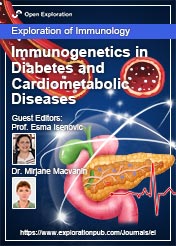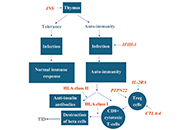
Immunogenetics in Diabetes and Cardiometabolic Diseases
Guest Editors
Dr. Esma Isenovic E-Mail
Department of Radiobiology and molecular genetics, "Vinca" Institute of Nuclear Sciences- National Institute of the Republic of Serbia, University of Belgrade, Belgrade, Serbia
Dr. Mirjana T. Macvanin E-Mail
Department of Radiobiology and molecular genetics, "Vinca" Institute of Nuclear Sciences- National Institute of the Republic of Serbia, University of Belgrade, Belgrade, Serbia
About the Special lssue
Background
An escalation of diabetes, obesity, and hypertension has been observed in the past decade and is accompanied by a parallel increase in the incidence of cardiometabolic complications. Diabetes mellitus (DM) is a chronic endocrinological disorder originating from multiple genetic and environmental factors that lead to perturbed carbohydrate, lipid, and amino acid metabolism. In particular, type 1 diabetes (T1DM), marked by the autoimmune destruction of insulin-producing pancreatic β-cells, is strongly linked to immunogenetic control and epigenetic regulation. Therefore, T1DM prevention should include timely detection by appropriate genetic screening as well as possible interventions aiming to modulate the autoimmune and inflammatory processes prior to the clinical onset of the disease. In recent years, therapies that target the immune system (immunotherapies) have gained substantial attraction regarding their potential to prevent type or delay T1DM. In addition, immune response provocation and inflammation accompanying DM and obesity represent key driving forces underlying atherosclerotic processes that result in adverse cardiovascular outcomes and increased morbidity and mortality associated with cardiovascular disease (CVD). Thus, immunogenetic-based diagnostic methods and therapeutic approaches that inhibit atherosclerosis-associated inflammatory pathways with limited immunosuppressive side effects potentially represent a promising strategy for managing CVD associated with metabolic disorders.
Goal
Additional scientific efforts are required to identify immunogenetic components involved in the pathogenesis of T1DM and CVD. Approaches based on integrating data obtained in animal and human preclinical and clinical studies as well as data collected by using high-throughput methodologies, may facilitate the understanding of the genetic and immune system framework associated with these diseases, leading to the possible identification of appropriate targets for the design and development of novel therapeutic agents. We wish to encourage discussion regarding identifying and characterizing immunogenetic factors associated with diabetes and cardiometabolic diseases. The prospect of developing novel immunogenetic-based screening platforms for risk assessment, diagnosis, and prognosis of T1DM and cardiometabolic disease is particularly interesting. Also, we would like to provide a comprehensive overview of future perspectives regarding developing immunogenetic therapies for treating T1DM and associated cardiovascular complications.
Scope and Author information
This Special Issue aims to cover novel research and clinical trends in identifying, characterizing, and assessing immunogenetic factors associated with diabetes and cardiometabolic diseases. We welcome contributions in the form of original articles, reviews, case reports, and preclinical and clinical studies. Areas to be covered in this Special Issue may include, but are not limited to:
· Immunopathology of Diabetes and cardiovascular diseases
· Genetic basis of immune response associated with diabetes and cardiometabolic disorders diseases
· Genetic factors associated with inflammation in diabetes and cardiometabolic disorders
· Development and validation of immunogenetic screening for risk assessment and diagnosis of T1DM and cardiometabolic diseases
· Prospects of developing immunogenetic-based therapeutic strategies for T1DM and CVD treatment
Keywords: Diabetes, T1DM, cardiometabolic diseases, cardiovascular disease, immune response, inflammation, immunogenetics, diagnostics, screening, immunotherapy
Published Articles
